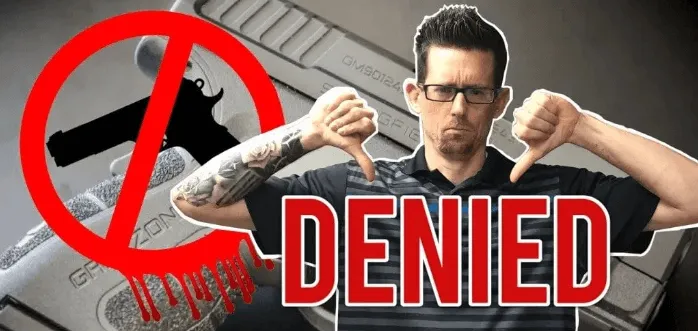Florida Concealed Carry Law Blog
Follow Us for News, Tips , Tricks, Guns Gear and Real Life Stories

When Is It Legal to Use Deadly Force In The State of Florida?
One of the most common questions I receive during my Florida concealed carry permit course is "When Is It Legal to Use a Firearm In Self Defense In The State of Florida?"
This is a very complicated answer, but I'll do my best to make it easy for you. Florida Statute 776.012(2) is known as the Justifiable Use of Force statute. This statute lays out the framework for when we are allowed to use or threaten the use of deadly force. Here's what the statute says:
Florida Statutes 776.012 (2) Use or threatened use of force in defense of a person. A person is justified in using or threatening to use deadly force if he or she reasonably believes that using or threatening to use such force is necessary to prevent imminent death or great bodily harm to himself or herself or another or to prevent the imminent commission of a forcible felony. A person who uses or threatens to use deadly force in accordance with this subsection does not have a duty to retreat and has the right to stand his or her ground if the person using or threatening to use the deadly force is not engaged in a criminal activity and is in a place where he or she has a right to be.
Before you can truly understand when it's legal to use a firearm in self-defense, you must first understand the meaning of a few keywords found in Florida Statutes 776.012(2).
What Does Reasonable Belief Mean?
Have you ever heard the phrase, “I was in fear of my life?” Firearms owners love to throw this phrase around as if it is the checkmate for using a firearm in self-defense. They believe that as long as they are in fear of their life, they have a right to use a gun in self-defense. Just because they believe their life was in danger doesn't mean this opinion would be shared by the police, judge, jury, prosecutors, or even the public.
The term “reasonable belief” must be applied objectively and subjectively. Objectively, the person who uses or threatens to use deadly force must genuinely believe they or someone around them was about to die, become the victims of severe bodily injury, or stop the imminent commission of a forcible felony.
A reasonable person, the jury, would have to look at the facts of the situation through the eyes of the individual who used deadly force to determine if they would have done the same thing in the same set of circumstances. This would be the subjective interpretation of reasonable belief.
If you were walking down the street and a man walked up and pimp-slapped you in the face, you may have genuinely believed that you were going to die. But would a reasonable person believe you were going to die from a slap? I don't think so.
What If My Reasonable Belief Turns out to Be Wrong?
Scenario - You're leaving work at 3:30 in the afternoon, and you're approached by a homeless man asking for some spare change. As the man approaches, he lifts his shirt to reveal a firearm. You quickly realize this is no ordinary man asking for change; this is an armed robbery. You promptly drop your belongings and immediately move laterally as you draw your firearm from concealment, firing three shots into the homeless man's chest. When the police arrive, you inform them that the attacker had a gun and was attempting to rob you. However, the police discovered that the attacker did not have a firearm; it was a BB gun.
Based on this scenario, when the attacker flashed his gun and threatened to shoot the victim, was it reasonable for the victim to believe that the homeless man had a real gun and intended to kill him? In the victim's mind, objectively, the answer is yes. The victim had no way of knowing whether the firearm was real or not. The jury would have to look at this scenario through the eyes of the victim, and even though after the fact, the firearm was determined to be a BB gun, in the moment it was reasonable to believe, objectively and subjectively, that it was a real gun.
What Does Imminent Mean?
Many firearm owners and concealed permit carriers have a false belief that they will have a five-minute-long decision-making process as to whether a firearm is justified or not. This is not true.
Dictionary.com defines the term imminent as "likely to occur at any moment; impending."
The term imminent death does not refer to your fear of death within the next hour, 30 minutes, or even 10 minutes. It refers to the potential death of yourself or someone around you at any moment or within seconds. If a crazy man is threatening to stab you with a knife, but the man is 100 yards away, would it be reasonable to believe you were in danger of imminent death? Are you going to die within seconds? Of course not.
What Does Great Bodily Harm Mean?
The State of Florida does not provide a statutory definition for great bodily harm. However, a Florida court describes great bodily harm as more than "slight, trivial, minor, or moderate harm and as such, does not include mere bruises…" Heck v. State, 774 SO.2d 844, 845 (Fla. App. 2000) I would interpret it to mean a severe injury like a broken bone, brain damage, loss of organ function, disfigurement, head trauma, or a large cut. Again, this is just my opinion.
What Does A Forcible Felony Mean?
A forcible felony is any of the following 16 crimes:
Treason F.S. 876.32 Treason against the State shall consist only in levying war against the same, or in adhering to the enemies thereof, or giving them aid and comfort. Whoever commits treason against this State shall be guilty of a felony of the first degree
Murder
Manslaughter F.S 782.07 (1) The killing of a human being by the act, procurement or culpable negligence of another, without lawful justification according to the provisions of chapter 776 and in cases in which such killing shall not be excusable homicide or murder, according to the provisions of this chapter, is manslaughter….
Sexual Battery F.S. 794.011 (h) means oral, anal or vaginal penetration by, or union with, the sexual organ of another or the anal or vaginal penetration of another by any other object; …
Carjacking F.S. 812.133(1) means the taking of a motor vehicle which may be the subject of larceny from the person or custody of another, with intent to either permanently or temporarily deprive the person or the owner of the motor vehicle, when in the course of the taking there is the use of force, violence, assault, or putting in fear.
Home-Invasion Robbery F.S. 812.135(1) means any robbery that occurs when the offender enters a dwelling with the intent to commit a robbery, and does commit a robbery of the occupants therein.
Robbery F.S 812.13 (1) means the taking of money or other property which may be the subject of larceny from the person or custody of another, with intent to either permanently or temporarily deprive the person or the owner of the money or other property, when in the course of the taking there is the use of force, violence, assault or putting in fear.
Burglary 810.02 (1)(a) …means entering or remaining in a dwelling, a structure or a conveyance with the intent to commit an offense therein, unless the premises are at the time open to the public or the defendant is licensed or invited to enter or remain.
Arson F.S. 806.01 (1) Any person who willfully and unlawfully, or while in the commission of any felony, by fire or explosion, damages or causes to be damaged: (a) Any dwelling, whether occupied or not, or its contents; (b) Any structure …
Kidnapping F.S. 787.01 (1)(a) means forcibly, secretly or by threat confining, abducting or imprisoning another person against her or his will and without lawful authority, with intent to: 1. Hold for ransom or reward or as a shield or hostage. 2. Commit or facilitate commission of any felony. 3. Inflict bodily harm upon or to terrorize the victim or another person. 4. Interfere with the performance of any governmental or political function.
Aggravated Assault F.S. 784.021 (1) An "aggravated assault" is an assault: (a) with a deadly weapon without intent to kill; or (b) with an intent to commit a felony.
Aggravated Battery F.S. 784.045 (1)(a) A person commits aggravated battery who, in committing battery: (1) intentionally or knowingly causes great bodily harm, permanent disability or permanent disfigurement; or (2) uses a deadly weapon.
Aggravated Stalking F.S 784.048 (3) A person who willfully, maliciously and repeatedly follows, harasses or cyber stalks another person and makes a credible threat to that person commits the offense of aggravated stalking.
F.S 784.048 (1)(c) "Credible threat" means a verbal or nonverbal threat, or a combination of the two, including threats delivered by electronic communication or implied by a pattern of conduct, which places the person who is the target of the threat in reasonable fear for his or her safety or the safety of his or her family members or individuals closely associated with the person, and which is made with the apparent ability to carry out the threat to cause such harm. It is not necessary to prove that the person making the threat had the intent to actually carry out the threat…
Aircraft Piracy F.S 860.16 Whoever without lawful authority seizes or exercises control, by force or violence and with wrongful intent, of any aircraft containing a nonconsenting person or persons within this State…
Unlawful throwing, placing or discharging of a destructive device or bomb.
Any other felony which involves the use, or threat, of physical force or violence against any individual.
Think About These Situations
How much time do you have to make a decision in one of these situations? A fraction of a second. So, when should you decide when you're going to use your firearm and when you're never going to use it? Right now. You must start thinking about these situations today. I call it the “what would I do if” game. We’re going to talk more about how to play the “What Would I Do If Game” in chapter 16.
Florida’s Stand Your Ground Law
The Old Law — Before 2005
Before 2005, Florida had a retreat law. The retreat law said that you had a duty to retreat before using or threatening to use deadly force if you could retreat safely. The retreat law did not apply if you were attacked in your home or place of business. Imagine you're walking down the street and a man approaches with a knife, threatening to stab you. Under the retreat law, you would not have a right to defend yourself. You would be obligated to run away. Only if the attacker pursued or prevented you from running would you have a right to protect yourself. The last thing I want to do is turn my back on someone who is threatening me with a knife.
The New Law - After 2005
Florida's "stand your ground" law was passed in 2005 and was a major victory for lawful gun owners. Stand your ground eliminates the duty to retreat if you reasonably believe that such force is necessary to prevent imminent death, great bodily harm, or the imminent commission of a forcible felony. For the duty to retreat to be eliminated, you must be in a place where you have a right to be and not be engaged in criminal activity.
Florida Statutes 776.012 (2) A person is justified in using or threatening to use deadly force if he or she reasonably believes that using or threatening to use such force is necessary to prevent imminent death or great bodily harm to himself or herself or another or to prevent the imminent commission of a forcible felony. A person who uses or threatens to use deadly force in accordance with this subsection does not have a duty to retreat and has the right to stand his or her ground if the person using or threatening to use the deadly force is not engaged in a criminal activity and is in a place where he or she has a right to be.
One of the requirements for the right to stand your ground under Florida Statute 776.012(2) is that the person using or threatening to use the deadly force is not engaged in a criminal activity and is in a place where he or she has a right to be. If this person was committing a crime or was in a place they did not have a right to be, the stand your ground provision would no longer apply. That individual would be required to retreat if they could do so safely.
I cover this topic and a whole lot more in my 270 page book "Florida Concealed Carry Law," and you can get a FREE copy today, just pay a small fee of $9.95 shipping and handling.
That's all I have for today. So until next time keep training and stay safe...
Talk to you soon,
Ryan G.
Don't Miss a Thing!
Get Notified When We Post a New Article
Most Popular Concealed Carry Articles

Florida Private Gun Sales Rules

Am I Eligible For A Florida Concealed Carry Permit?
Get FREE Access To The Florida Concealed Carry Masterclass™
Join over 60,000 Floridians Who Chose Tampa Carry To Get Their Florida Concealed Carry Permit
All rights Reserved. Copyright 2026 Tampa Carry



